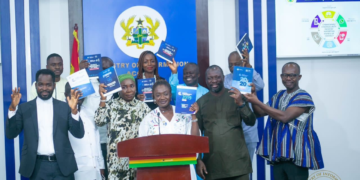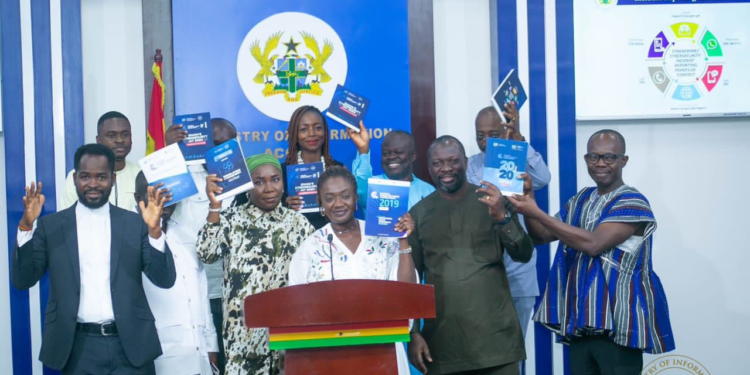The National Cybersecurity Awareness Month (NCSAM) has officially kicked off, with the primary objective of elevating digital security consciousness and empowering both individuals and organizations to safeguard their personal data in the face of an ever-evolving global digital landscape. Launched at the Ministry of Information in Accra on Sunday, September 3, 2023, the event, scheduled to run throughout October, bears the theme: “Promoting a Culture of Digital Safety.”
Deputy Minister of Communications and Digitalisation, Ama Pomaa Boateng, presided over the inaugural ceremony, emphasizing the transformative impact of digital technologies on the lives, work, and interactions of people. However, she also underlined the concurrent rise in risks for individuals, organizations, and societies due to the rapid advancement of the digital age.
In her address, the Minister of Communications and Digitalisation, Ursula Owusu-Ekuful, highlighted the prevalence of cyber threats such as cyberbullying, privacy breaches, misinformation, and disinformation. She pointed out that even as Ghana scaled up connectivity and encouraged e-commerce activities as part of the government’s digitalization agenda, the country was not immune to these risks.
Recent statistics painted a vivid picture of Ghana’s digital landscape. According to the Groupe Special Mobile Association’s Connectivity Index 2023 Report, Ghana ranked third in Africa with a score of 51.4% in internet penetration over the last five years. Additionally, the report noted Ghana’s impressive score of 86.69% in Online Security, aligning with its standing on the ITU’s Global Cybersecurity Index. The report also revealed that Ghana’s internet access rate in 2023 stood at 23.05 million, representing 68.2% of the population, with 6.6 million (19.5%) actively engaged in social media activities.
However, these advancements came with a price. Ghana’s exposure to high-risk cyber threats, including Romance Scams, Phishing, Advance Fee Fraud, Online Bullying, Sextortion, and Online Impersonation, had escalated.
The NCSAM launch serves as a call to action, bringing together government officials, private sector players, business executives, cybersecurity professionals, educationists, civil society organizations, and media representatives to promote cybersecurity awareness and address these concerns.
Dr. Albert Antwi-Boasiako, Director General of the Cyber Security Authority, stressed the importance of creating awareness and fostering secure online practices for a safer digital Ghana. He indicated that the NCSAM would encompass a range of activities dedicated to educating and conscientizing both organizations and the broader Ghanaian public about the opportunities and threats in cyberspace.

Cybersecurity, as highlighted by Dr. Kenneth Ashigbey, CEO of the Ghana Chamber of Telecommunications, is a collective responsibility that involves everyone. Investments by banks, represented by John Awuah, President of the Ghana Association of Banks, have been made to ensure secure transactions on digital channels.
Albert Kwabena Dwumfour, President of the Ghana Journalists Association (GJA), pledged the association’s support for NCSAM to enhance cybersecurity practices in the country.
Carl Sackey, representing the Board of the Cyber Security Authority, underscored the necessity of collective action by Ghanaians to safeguard digital assets, intellectual property, and private information.
In a statement delivered on behalf of the President of ISACA (Accra Chapter), Daniel Gyampo emphasized that in today’s interconnected world, the significance of cybersecurity cannot be overstated. Col. Dr. Tim Ba-Taa-Banah, representing the Joint Cyber Security Committee, appealed to ministries, departments, agencies, and civil society to actively participate in the NCSAM.
The NCSAM, which originated in the United States in 2004 under the auspices of the US Department of Homeland Security, has evolved into a collaborative international event, with Ghana being the latest nation to join the effort to promote cybersecurity awareness and ensure a safer digital future for all.

































